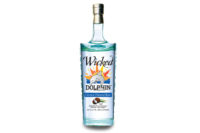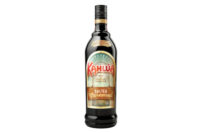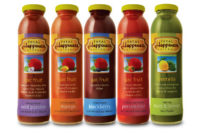2014 Beverage Innovations of the Year
Health and wellness, personalization trends encompass Beverage Industry’s list of industry-changing products




In the sea of beverages on the retail shelves, consumers definitely have no shortage of options from which to choose. When you take into account the number of new SKUs out there, it can get even more intriguing. According to Chicago-based Mintel’s Global New Products Database, 3,459 new beverages have been launched in the first 10 months of 2014. As beverage-makers continue to churn out these new products, some brand owners are taking a cue from popular industry trends to offer consumers something that stands out within their respective categories.
The editors of Beverage Industry analyzed the new beverage market launches of 2014 and determined five brands that they think are energizing the U.S. drink market and its consumers. To highlight those brands, the team has named them Beverage Industry’s 2014 Innovations of the Year.
Chimp Food
Throughout the consumer packaged goods (CPG) market, better-for-you products have become a top trend. In fact, Information Resources Inc. (IRI), Chicago, noted the impact this trend had on its 2013 New Product Pacesetters, which were announced in March. “Innovation in 2013 is all about healthier-for-you products,” said Susan Viamari, editor of Thought Leadership for IRI, in a statement. “‘Healthy is truly everywhere. From food and beverages to hair care, skin care, and even pet food and cleaning products, consumers not only want to look and feel their best, but they want improved wellness to extend to their homes and pets, too.”
It seems as though that mindset for innovations has continued into 2014. Chimp Food, Hollywood, Fla., released a line of meal replacement beverages that closely mimic the diet of chimpanzees. The company explains that two-thirds of a chimp’s diet consists of fruit and berries, and one-third of its diet comes from vegetables, nuts and seeds. Taking influence from this, the company developed its same-named meal replacement drinks, which contain 25 different raw, uncooked fruits, berries, vegetables, nuts and seeds — including the peels, skins and seeds of the fruits and vegetables.
“Chimp Food is a super healthy meal that you drink,” says Scott Joseph, founder and chief executive officer of Chimp Food. “It’s simply real, raw, whole food perfectly portioned and then blended together.”
Joseph developed the brand when he was dealing with his own weight and health struggles. Considering that the genetic makeup of chimpanzees makes them one of the closest mammals to humans, Joseph compared the lifestyle and diets of these mammals to humans. After becoming intrigued by the healthy lifestyles of chimpanzees, he decided to follow in their footsteps. “Since our digestive systems are basically identical, it only makes sense [that] we should eat like them, and chimps eat fruits, berries, veggies, nuts and seeds,” he says.
For the U.S. consumer, Joseph explains that Chimp Food is the next generation of the juicing and cleansing beverages. He also notes that the products are appealing for vegans, vegetarians, and those with dietary restrictions like lactose free or gluten free. “Many consumers with dietary restrictions struggle to get enough protein, carbs, vitamins or fiber in their diets,” Joseph says. “Chimp Food combines 25 high-nutrient foods in one bottle — it’s convenient, all natural and satisfying.”
Drinkmaple
Another beverage brand that has been influenced by the better-for-you market is Drinkmaple, Concord, Mass., and its flagship product maple. Kate Weiler, co-founder of the company, notes that she first learned about maple water when competing in an Ironman triathlon in Canada and sampled another maple water brand.
“We were very intrigued that maple sap was naturally hydrating, and we bought it,” she says. “We loved the refreshing qualities and the subtle maple flavor. We were dumbfounded that we were shipping coconuts from across the world for our natural hydration when we had a resource right here that we weren’t utilizing. We loved the concept of a natural hydration drink coming straight from maple trees.”
The company’s maple. brand is pure sap from maple trees and does not contain preservatives, flavors or sweeteners. Weiler notes that the beverage helps fulfill the all-natural hydration need states for both everyday use and workout replenishment.
The product also has seen early success with consumers. “The consumer reaction has been wonderful,” Weiler says. “Most people are unaware that maple sap is 98 percent water and that it’s an all-natural source of hydration that also tastes great. We have found that many consumers are drinking other drinks because they like the idea of a functional, plant-based natural hydration [drink] but don’t really enjoy the taste. ‘All natural’ has become a loose term in the industry, and it is refreshing to consumers to learn that our maple water is truly natural and only has one ingredient.”
To further its reach, Weiler adds that the company will be announcing expanded distribution, revised packaging, and additional size offerings in 2015.
Malibu Sparklers
Also pulling influence from healthy hydration segments was Purchase, N.Y.-based Pernod Ricard USA’s Malibu Rum Sparklers. Noting the growth of the coconut water market, the spirits brand took that inspiration a step further.
“Malibu’s track record for inno-vation is quite robust from our grab-and-go offerings to flavors to category cross-over products,” says Josh Hayes, senior brand manager for Malibu. “For the new Malibu Rum Sparkler range, we were inspired by the growth of daytime consumption opportunities and the growth of the coconut water segment. Flagship markets such as Las Vegas and Miami are seeing tremendous growth within the day-drinking/partying world.
“Weekend brunches are exploding in popularity across the U.S., and backyard celebrations around the barbeque never go out of style,” he continues. “The growth of coconut water is huge, and it’s attracting premium consumers.”
The Malibu Rum Sparklers combine coconut water and effervescence and are packaged in a Champagne-style bottle including the cork. The brand released the product in coconut and peach-coconut flavors.
In addition to utilizing coconut water to attract consumers who have an interest in premium products, Malibu Rum Sparklers are designed to casually connect friends, Hayes explains. “The pop of a cork signals the party is just getting started,” he says. “Once you have a bottle of Malibu Rum Sparkler open, you just want to pour a glass for all your friends, so it’s very inclusive and social.”
Hayes adds that the company has been very pleased with the new products’ off-premise launch and has selected a few trophy markets to test its opportunities in on-premise.
Starbucks Iced Coffee – Brewed to Personalize
Another trend that has influenced the beverage market is customization. Starbucks Coffee Co., Seattle, combined this trend with the growing popularity of ready-to-drink (RTD) iced coffee for its new Starbucks Iced Coffee – Brewed to Personalize line.
“Starbucks Iced Coffee – Brewed to Personalize beverages are the first multi-serve iced coffees in the chilled coffee category that are fully customizable,” a Starbucks spokesperson says. “Customization is a big part of the Starbucks experience, and Starbucks Iced Coffee – Brewed to Personalize beverages allow customers the option to customize with their favorite dairy and sweeteners at home.”
After the successful launches of Starbucks single-serve RTD iced coffee and Discoveries Iced Café Favorites in the multi-serve format in 2013, the company was well positioned to serve the growing iced coffee market in the United States, the spokesperson adds. Capitalizing on this trend, Starbucks launched Starbucks Iced Coffee – Brewed to Personalize in June.
Available in Lightly Sweetened, Unsweetened and Caramel varieties, Starbucks Iced Coffee – Brewed to Personalize beverages allow consumers to bring the coffee shop experience into their homes.
Consumers have shown their support for the new beverages. Since its launch, Starbucks Iced Coffee – Brewed to Personalize beverages have achieved 18.9 percent dollar share, the spokesperson says, citing Chicago-based Information Resources Inc.’s data for the four weeks ending Oct. 5 in multi-outlets.
Wicked Dolphin RumShine
In the spirits industry, it can be difficult to find what quality will help your brand stand out from the crowd. Cape Spirits Inc., Cape Coral, Fla., seems to have found that niche with its newest product: Wicked Dolphin RumShine.
Distilled from pure Florida cane sugar, the product actually was developed to showcase the state of Florida. “We grow about 50 percent of the sugarcane for the U.S. here, and agriculturally we grow so [much] citrus [and] berry and some unique fruits and spices,” says JoAnn Elardo, president of Cape Spirits. “Florida should have its own rum, [and] that is why we developed Wicked Dolphin Rum. RumShine was developed because I started exploring the history of Florida and the Everglades.”
Elardo notes that the stories that she read and heard about when the Everglades were being cleared for some of the sugarcane farms in the early 1900s sparked an interest for her. “One story was about some of the men working the ‘river of grass’ and how they hunted, farmed and basically created their own spirits in the Everglades,” she says. “RumShine is a take on something they would have created from the sugarcane they planted.”
The spirit features higher proof than traditional rum, Elardo says. “We take a deep heads and tails cut to give you the best rum we can,” she explains. “We also use some of the best ingredients we can find. It’s a fun product that is great at barbeques, tailgating, on the boat, or just [as] a refreshing cocktail.”
RumShine launched in September in Florida in Blueberry, Strawberry and Apple Pie flavors.
Looking for a reprint of this article?
From high-res PDFs to custom plaques, order your copy today!









